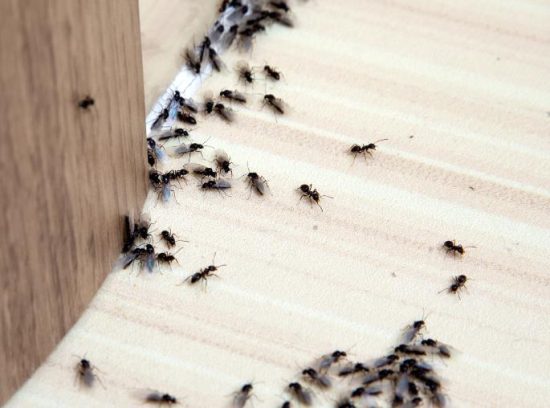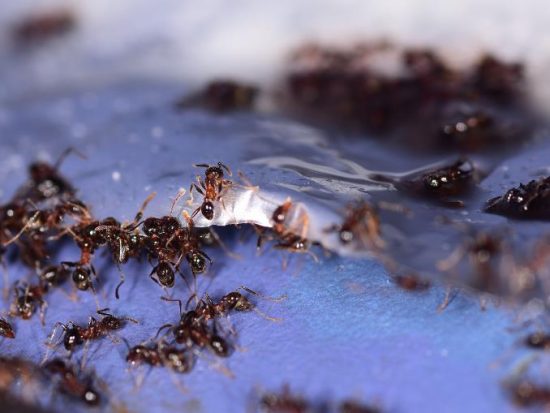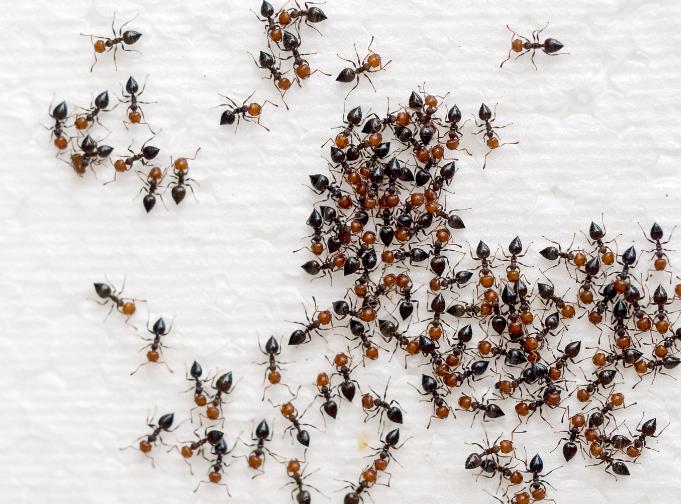Finding out there are ants in your bedroom can be rather upsetting. To make sure your bedroom stays a peaceful, ant-free zone, you need to use practical tactics. Here, we look at 15 easy ways how to get rid of ants in bedroom. These techniques address different facets of an ant infestation, regardless of the entry points—small cracks, dampness, or food scraps. Every tactic, from using natural repellents to keeping everything spotless, makes an area less appealing to ants. By being proactive, you can keep your bedroom a place of calm and relaxation rather than a haven for ants.
15 Easy Ways How to Get Rid of Ants in Bedroom?

1. Understand the Ant’s Entry Point
The first important step is determining how ants get into your bedroom. Examine the spaces surrounding doors, windows, and any wall fractures. It is easier to concentrate your ant control efforts when you are aware of their entry points. Examine less apparent places with a flashlight, such as under carpets and behind furniture. Look for moist spots, such as those next to humidifiers or air conditioners, that could draw ants. Once found, designate these areas as the targets of your first treatments. To learn more about the ants’ movement patterns, it’s helpful to keep an eye on these spots for a few days. This comprehensive examination helps prevent future incursions in addition to providing immediate control. Recheck these places regularly, particularly in the warmer months when ants are more active.
2. Keep Your Bedroom Immaculate
Ants are frequently attracted to food particles that are not easily identifiable. To remove any leftover food particles, vacuum often and clean surfaces daily. Pay close attention to nightstands and other locations where food may be consumed. Ensure to clean up after meals or snacks right once to prevent leaving crumbs behind. Even if food and snacks are only in the room for the night, put them in sealed containers. Remember to regularly empty and clean any trash cans in the space. Using a garbage can with a cover may help further discourage ants from foraging. Regularly washing drapes and bedding can also aid in getting rid of any food residues or stains that might attract ants. Keeping up a regular cleaning regimen is essential to maintaining an ant-free zone.
3. Use Natural Repellents
Ants can be avoided using natural repellents like peppermint oil, cinnamon, or lemon juice. To keep ants away, apply these materials along the perimeter of the bedroom and around any access sites. Vinegar is also a good choice because the ants’ scent trails are disturbed by its potent aroma. Because the fragrance of coffee grounds repels ants, scatter them close to entry locations. Another way to keep ants out of closets, drawers, and windowsills is to put bay leaves there. Essential oils like tea tree and clove smell lovely, and ants detest them. To disperse these oils’ aroma throughout the space, use a diffuser. Over time, frequent reapplication of these all-natural repellents will strengthen their effectiveness.
4. Seal Entry Points
To stop future intrusion, caulk or putty any gaps or openings. This approach keeps young ants out of your bedroom, ensuring a permanent fix. Since pipes and wires are frequent access places for ants, pay close attention to these locations. Install weather stripping on windows of the bedroom and doors to seal any openings ants could use to enter. Look for any cracks in the baseboards and floorboards that might require sealing. Expandable foam sealant can provide a more effective covering for more significant gaps. Inspect and maintain these seals regularly, especially after extreme weather events that may cause structures to shift. You can protect your bedroom from ants and other pests by taking preventative measures.
5. Deploy Ant Baits

Ant baits attract ants to a poison that they then transport back to their colony. Place baits close to the ant colony’s hub of activity, keeping them out of the reach of kids and animals. Select bait stations made especially for indoor use to prevent accidental exposure. Ensure the bait stations are kept effective by routinely checking on them and replacing them as necessary. Place them along the ants’ paths to increase the likelihood that the baits will be discovered and returned to the ant colony. Be patient since the full effects of the bait on the colony may not be felt for a few days to a few weeks. Different baits are also a good idea, as ants may prefer different food sources depending on the season and their nutritional needs. By strategically using and managing ant baits, you can target the problem at its source—the colony itself.
6. Consult a Professional
Seek expert assistance if the ant problem in your bedroom doesn’t go away. Depending on the particular kind of ant and the extent of the infestation, a pest control professional might offer customized treatments. More effective therapies and tactics that are not available to the general public are available to professionals. Additionally, they are able to precisely identify the species of ants, which is useful in figuring out the best course of action for treatment. To locate nests and destroy them, an expert can carry out a comprehensive inspection, stopping further breakouts. They can also assist in more successfully sealing up entrance points and provide guidance on long-term preventive measures. Hiring a professional guarantees that the issue will be resolved quickly, safely, and with the least amount of damage to your house and health. Follow-up visits of professionals can be arranged to ensure that the ant problem is completely resolved, giving you peace of mind. By relying on expert knowledge and resources, you can achieve a more permanent solution to your ant infestation.
7. Regularly Dispose of Trash
Maintaining a garbage can in your bedroom calls for cautious maintenance. To keep ants away, ensure the lid fits tightly and is emptied often. Remaining residues that attract pests can also be avoided by disinfecting the can. If you want to improve the hygienic quality of your disposal and reduce the likelihood of spills, think about lining your garbage cans. Store food waste in a different, sealed container and dispose of it outside each day. Keeping the garbage can lid firmly in place may be more challenging if it is overfilled. Take care of what you put in your bedroom trash to avoid leaving behind smells that can draw ants and insects. By implementing these tips, you can keep your bedroom ant-free and cleaner.
8. Dehydrate the Ants
To efficiently kill ants through dehydration, scatter diatomaceous earth in your bedroom. Apply it primarily under the bed, in corners, and along baseboards. Due to its tiny powder, diatomaceous earth should only be sparingly applied in thin layers to prevent clumping, which will lessen its efficiency. Make sure you use diatomaceous earth of food grade, which is deadly to insects but harmless for humans and pets. Reapply after cleaning or if the area gets wet because moisture might reduce the product’s effectiveness. Diatomaceous earth mainly targets ants that cross its path, so it’s advantageous to utilize this strategy with other tactics. To prevent inhalation, wear a mask when applying the powder and ensure adequate ventilation in the room. Maintaining a barrier that deters ants from entering can be facilitated by regular use.
9. Control Moisture Levels
Your bedroom might be made less wet to discourage ants. To keep humidity levels low, use a dehumidifier or make sure there is adequate ventilation. Look for any areas where there may be condensation or water leaks, particularly near windows or plumbing, and take quick action to fix these problems. Use moisture-absorbing materials in closets and drawers with little air circulation, and utilize a dehumidifier. Ensure all air conditioners aren’t adding to the surplus moisture by routinely inspecting and cleaning their filters. When the weather permits, open the windows to let fresh air into the room and dissipate moisture. Plants should be kept well-drained and away from walls to reduce the amount of extra moisture sources. Continuing these actions can make the area less appealing to ants and lessen the likelihood that they will return.
10. Remove Potted Plants Temporarily

Ants may be drawn to potted plants because of their moisture content and hiding ability. Till the ant problem is fixed, take these plants out of your bedroom. Doing this will eliminate a frequent point of attraction and lessen the chance that ants may build a nest close to where you sleep. Before moving the plants to a different area of your house, check the pots and the plants for evidence of ant trails or colonies. To deter ants from returning, spray the soil with natural ant repellents like peppermint oil or cinnamon. To get rid of any last smells or residues, be sure to thoroughly clean the spaces where the plants were initially positioned. Once the ant issue is entirely under control, you can reintroduce the plants into your bedroom, ensuring they are clean and free from excess moisture. Regularly checking and take care the health of your plants will help prevent future infestations.
11. Use a Vacuum Cleaner
Utilize a vacuum cleaner to eradicate ants and their traces quickly. Make sure you empty the canister or dispose of the vacuum bag immediately. This process guarantees that the ants are physically expelled from the area and keeps them from returning to the room. The pheromone trails that ants leave behind to direct other ants to food sites can also be removed by vacuuming. Vacuum anywhere you’ve spotted ants, even tucked-away places such as behind furniture and beneath beds. Frequent vacuuming can help remove possible food sources, preventing the entry of new ants. To get the most outstanding results, pick a vacuum with a HEPA filter that can collect even the smallest particles. This proactive approach addresses current ant issues and helps maintain a cleaner and less inviting environment for future infestations.
12. Sprinkle Cornmeal
An effective way to treat ant infestations is with cornmeal. Because ants cannot digest it, it is lethal to them but nontoxic to children and pets. Apply it to the afflicted regions. Concentrate on scattering cornmeal where you regularly see ant activity, like along their paths and at access points. Ensure the cornmeal is dispersed uniformly and in places where the ants can readily obtain it. To keep the cornmeal effective, reapply it every few days. Cleaning operations and air movements might scatter or dilute the cornmeal. This strategy functions because the ants bring the cornmeal back to their nest, where they eat it and ultimately cause the colony to die. While it’s a slower method of ant control, it is a natural and nontoxic option, making it ideal for homes with pets and children. Additionally, combine this tactic with other methods to enhance overall effectiveness in managing ant problems in your home.
13. Employ Citrus Peels
Ants do not like the overpowering citrus smell. Put peels from oranges or lemons in your bedroom; change them out as the peels become less effective. This organic repellent not only deters ants but also adds a nice scent to the air. Disperse the peels in and around any areas where ant activity has been noticed, including corners and entry points. The perfume fades as the peels dry, so it’s significant to replace them frequently to maintain a potent aroma. If you want to leave a barrier-forming residue on windowsills and door thresholds, you can also rub the peels directly on them. Consider boiling citrus peels to make a concentrated spray that may be sprayed more widely throughout the space for extra potency. Mixing citrus oil with water for a spray solution is another effective way to use this method to keep ants at bay.
14. Create a Barrier with Chalk
Chalk’s calcium carbonate concentration makes it a good ant-repellent. Draw lines around any spots that ants frequently visit, such as access points. Ants are reluctant to cross the physical barrier created by this easy technique. For best results, make sure the chalk lines are thick and continuous. Periodically, especially after cleaning, or if they become disturbed, you might need to redraw the lines. It is important to apply chalk in dry conditions since wet conditions might cause the chalk to wash off or dissolve. For a multi-layered defense, think about combining chalk with other deterrents like citrus peels or fragrant scents. Chalk is a cheap, nontoxic, and safe ant deterrent that’s perfect for spot applications in the house.
15. Utilize Essential Oils

For having a pleasant scent, essential oils like lavender, eucalyptus, and tea trees naturally ward off ants. Spray the afflicted regions after mixing these oils with water. Add a few drops of detergent to the mixture for a stronger effect. This will aid in the oil’s emulsification and help it adhere to surfaces when sprayed. Concentrate on treating the entryway, windowsills, baseboards, and corners—all of which are typical entry locations. Regular application is required because the fragrance fades with time. Additionally, these oils can be used in diffusers to keep an ongoing barrier against ants. If you have pets, use essential oils with caution since certain oils may be toxic to them. Try out several oil combinations to see which blend works best for your circumstances. This method not only keeps ants away but also keeps your bedroom smelling fresh and pleasant.
Conclusion
Cleaning your bedroom thoroughly, placing barriers strategically, and using natural repellents are all necessary for getting rid of ants. You can keep your personal space clean and make your surroundings uninhabitable for ants by putting these 15 techniques into practice. The secret to stopping more incursions is to implement these tactics consistently. Keep in mind that it could be time to hire an expert if you’ve tried a few different approaches and are still having problems with ants. In the end, having a tidy and safe bedroom will help keep these bothersome insects away and let you live in a quiet, ant-free environment.
Frequently Asked Questions (FAQs)
What causes ants to enter my bedroom?
Ants are usually attracted to bedrooms by the promise of food and dampness. Even trace amounts of food, such as crumbs, spills, or pet food, might attract ants. High humidity levels also attract ants to your bedroom.
Are there any risks to using chemical ant repellents?
Chemical repellents are effective, but they can offer health hazards, particularly in enclosed environments such as bedrooms. It is best to use them with caution and choose natural alternatives whenever feasible, especially if you have pets or children.
How long does it take to get rid of ants in the bedroom?
The time it takes to remove an ant infestation varies. Simple problems can be fixed in a few days with bait and cleaning. However, larger infestations or those involving several nests may take several weeks and require professional intervention.
Can ants cause damage to my bedroom?
While most typical house ants do not cause any structural damage, they can contaminate food and become a nuisance. Certain varieties, such as carpenter ants, can harm wood structures, but they are less likely to nest in dry bedrooms.

